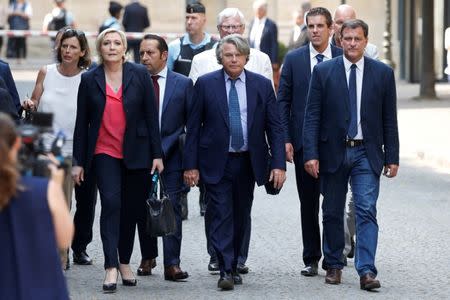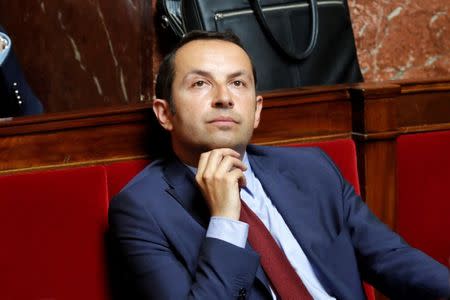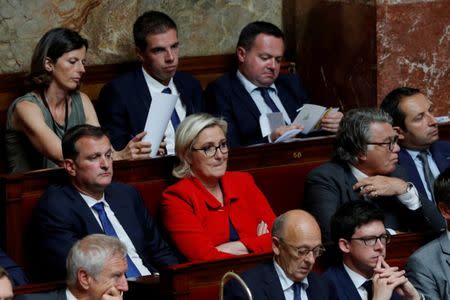Wounded National Front seeks way back after French poll failures
By Ingrid Melander PARIS (Reuters) - Top officials from France's far-right National Front gather on Friday to find a way back from successive election failures, and senior members said everything from the party's name to its vow to restore the franc currency were up for review. Leader Marine le Pen vowed to "deeply renew" the party after she lost the presidential election to centrist Emmanuel Macron in May. A month later, the National Front (FN) won just eight seats in a parliamentary poll, well short of the minimum 15 required to form a group that would have greater influence in the chamber. Both results came despite opinion polls pointing to a strong showing for the anti-EU, anti-immigration party, briefly spooking investors who worried that it would rock France's political establishment and with it the European Union. "We shouldn't cover up issues or look for quick fixes, but must instead get to the bottom of things, to be a challenger to be reckoned with in the next presidentials," Jerome Riviere, part of Le Pen's presidential campaign team, told Reuters. He will be one of around 40 senior party representatives meeting privately on Friday and Saturday on the outskirts of Paris, but with infighting spilling into the open and divisions over central policies wide, no final decisions are expected. The meeting will be followed by a questionnaire sent to National Front members in September and a party congress early next year. Among the biggest disagreements is the FN's economic policy, and in particular its rejection of the euro, an idea which is unpopular with the majority of the electorate but appeals to the party's core supporters. FN deputy chief Florian Philippot threatened to quit if the party's policy on restoring the franc was dropped, much to the annoyance of some senior colleagues. Le Pen, meanwhile, has left open the possibility of watering down that pledge, and two aides who were key to drafting her presidential platform told Reuters they were pushing in that direction, albeit with important caveats. Jean Messiha, who was in charge of Le Pen's presidential manifesto which included ditching the euro, said he would call at the seminar for the party to focus instead on what he called a "vital" challenge for France: the fight against immigration. Convinced that the euro zone is doomed anyway, but conceding that a prompt exit was unpopular with the broad electorate, both he and FN economist Bernard Monot would like the FN to remain in the euro if it came to power. They would then propose steps such as exiting the banking union, a move which they recognise would break euro zone rules. WHAT'S IN A NAME? Political analysts blamed the FN's election defeat on its lack of allies, distrust among voters for some of its hardline policies and a TV debate performance by Le Pen that some party officials admit was damaging. For Sophie Montel, a party member for nearly 30 years who will also attend the seminar despite being ousted this month from the FN's group in a regional council, the party must soften its tone and move away from focussing on hardline anti-immigration policies. "We need to come up with an optimistic message, embody hope and stop being caricatures of ourselves, a bit too aggressive," she told Reuters, urging the party to focus on issues including education. Montel's demotion came after she backed two younger colleagues who were pushing for major reforms and criticising the party's campaign logistics, and she plans to use the meeting to propose diluting some powers concentrated within the FN's headquarters. Despite tensions, there is one issue that unites most of the party's senior leadership, according to some FN officials: changing its name. It resonates in France and abroad, in part because people associate it with its founder, Marine's estranged father Jean-Marie le Pen, a politician known for his provocative style and convictions for incitement to racial hatred. It "frightens" people, said Philippot. At a time when opinion polls show the far-left France Unbowed to be a stronger opponent to Macron than the FN, analysts say the party faces one of its greatest challenges and would need time to rebound. "There might be a change in name and a ... repositioning on the euro, but that will not change the fact that this is a solitary party and that without alliances it cannot hope to have 50 percent of the votes," said Jerome Fourquet of Ifop pollsters. (Additional reporting by Simon Carraud; Editing by Mike Collett-White)

 Yahoo News
Yahoo News 


